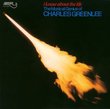| All Artists: Heitor Villa-Lobos, Sonia Rubinsky Title: Villa-Lobos: Piano Music; RudepoÍma; As TrÍs Marias Members Wishing: 0 Total Copies: 0 Label: Naxos Release Date: 10/30/2007 Genres: Classical, Latin Music Styles: Opera & Classical Vocal, Chamber Music, Historical Periods, Classical (c.1770-1830), Modern, 20th, & 21st Century Number of Discs: 1 SwapaCD Credits: 1 UPC: 747313273522 |
Search - Heitor Villa-Lobos, Sonia Rubinsky :: Villa-Lobos: Piano Music; RudepoÍma; As TrÍs Marias
 | Heitor Villa-Lobos, Sonia Rubinsky Villa-Lobos: Piano Music; RudepoÍma; As TrÍs Marias Genres: Classical, Latin Music |
Larger Image |
CD DetailsSimilar CDs
|
CD ReviewsVilla-Lobos's RudepoÍma, and a Treasure Trove of His Piano M J Scott Morrison | Middlebury VT, USA | 02/22/2008 (5 out of 5 stars) "Sonia Rubinsky, a Brazilian pianist long resident in the United States, has made something of a specialty of the works of Brazil's most noted composer, Heitor Villa-Lobos (1887-1959), and this is the sixth in her series of recordings which when finished will comprise all his extant works for piano. This issue contains what is undoubtedly Villa-Lobos's longest and most important piano piece, the 'Rudepoêma', a twenty-three minute rhapsody that is essentially a one-movement piano sonata. Written and named for Arthur Rubinstein -- whom Villa-Lobos teasingly called 'Rudi' after Rubinstein objected to his calling him 'Rubi' -- the title can be read to mean two different things: 'Rubinstein's Poem' or 'Savage Poem' ('Rude' in Portuguese means 'savage' or 'rough'). It is, of course, both of those things. In it Villa-Lobos describes his vast home country, especially its native and peasant peoples and the wildness of the Amazonian forest. The music is a congeries of wildly different textures, rhythms, harmonies and sonorities. It is certainly the most forward-looking, yet primitive-sounding, thing Villa-Lobos ever wrote for the piano. Rubinsky gives it a lyrical, yet wild, reading that is very satisfying. This recording's main rival is the incandescent performance by Marc-André Hamelin Villa-Lobos: Piano Music. The repertoire of Hamelin's and Rubinsky's CDs overlap only with the Rudepoêma and the three evocative character pieces 'The Three Marias.'
'As Três Marias' are short bagatelles that describe three women named Maria, life-long friends, who have died and taken their places as stars in the heavens. These pieces, lasting only a total of four minutes, are written primarily in the piano's middle and upper registers and contains some of the most twinkling starlike sounds one could imagine. They are played gorgeously here by Rubinsky. The rest of the numbers on this CD are short and characterful. 'Sul América' presents melodies and rhythms native to several South American countries. 'New York Sky Line Melody' (1939) and 'Melodia da montanha' (1938?) were written using the unusual method of taking a graphic representation of either New York's skyline or the Serra da Piedade mountains of Brazil and making melodies out of their contours. They are lovely perhaps in spite of their unusual origins. The two 'Saudades das Selvas Brasileiras' (1927) are a nostalgic homage to Latin America written when the homesick Villa-Lobos was living in Paris. The six numbers in the 'Petizada' (1912) suite portray aspects of the lives and characters of small children. ('Petizada' can be translated as 'Little Brats'.) 'O Gato e o Rato' ('Cat and Mouse', 1914) and 'Caixinha de musica quebrada' ('The Broken Music Box', 1931) are charmingly descriptive of their subjects. The almost Prokofievian 'Valsa da "Menina das nuvens"' ('The Girl of the Clouds', 1952) was discovered in 1989 and is taken from a Villa-Lobos opera. Two other charming pieces were found after Villa-Lobos died: 'Colleccão infantil' (1911), 'Carnaval de Pierrot' (1910). Clearly, the main reason to buy this CD is for the 'Rudepoêma' but I can almost guarantee than anyone who does will be charmed by the miniatures contained therein. As far as I know, most of these works are not otherwise easily available. This series is a worthwhile venture; Rubinsky and Naxos are to be congratulated for their enterprise. Scott Morrison" |



